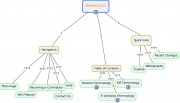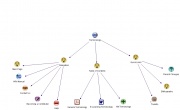Difference between revisions of "Mind Mapping"
From Learning and training wiki
| Line 12: | Line 12: | ||
*Generate a topic, which will be the focus of your thinking. The topic should be no more then a few words. | *Generate a topic, which will be the focus of your thinking. The topic should be no more then a few words. | ||
*Take a blank paper and write down the topic, wherever you want. It can be a good suggestion to start in the center of the paper, so that you have 360 degrees of freedom to continue your drawing. | *Take a blank paper and write down the topic, wherever you want. It can be a good suggestion to start in the center of the paper, so that you have 360 degrees of freedom to continue your drawing. | ||
| + | *To better identify and visualize the starting idea you can draw an image, using different colours. | ||
*Be open and have a creative attitude, trying to let ideas flow and to write all of them. | *Be open and have a creative attitude, trying to let ideas flow and to write all of them. | ||
*Free associate without limitating your ideas, you can always add new branches and write more information. | *Free associate without limitating your ideas, you can always add new branches and write more information. | ||
Revision as of 15:21, 10 October 2008
| A Learning methodology that consists of drawing diagrams used to represent words, ideas, tasks, processes or other items. It is a non-linear way of organizing information and a technique that allows to capture the natural flow of ideas. Each idea or fact is written down and then linked by lines or curves to its major or minor (or following or previous) idea or fact, thus creating a web of relationships. Its purpose is to focus attention, and to capture and frame knowledge to facilitate sharing of ideas and concepts.
Mind maps can be used to:
|
| In the table below there is a list of mindmapping tools. All of them are free-sources. You will also find some basic information about them, like if they are downoladable or only usable on-line, what kind of features and which degree of freedom in constructing the map they offer. By clicking the visualization image you will be able to see a sample map. |
| Tools | Type of Application | Special Features | Structure | Visualization |
|---|---|---|---|---|
| Freemind | To download
(1,51 KB) |
Link to files and web-sites | Ramification only horizontal. No freedom to change the structure. | |
| CMAP Tools | To downlad
(1,62 KB) |
Link to files and web-sites | Free structure. Every arrow connecting two nodes is supposed to contain a label | |
| Mindmeister | On-line. Two versions: Basic for free,
Premium to pay (4$ per month) |
Link to files and web-sites | Ramification only horizontal. No freedom to change the structure. | |
| Bubbl.us | On-line | Link to web-sites, impossible to link files | Free structure | |
| VUE | To download
(1,51 KB) |
Link to files and web-sites | Free structure. Possibility two add a label on the connection between two nodes. | |
| Compendium | To download
(1,58 KB) |
Link to files and web-sites | Free structure. Every node has to belong to a cathegory (question, decision, argument, idea..) | |
| Wisemapping | On-line | Link to web-sites, impossible to link files | Ramification only horizontal. No freedom to change the structure. | |
| Mind42 | On-line | Link to web-sites, impossible to link files | Ramification only horizontal. No freedom to change the structure. |
References
- ↑ astd-cac.net (08 July 2008) Wikipedia(08 July 2008) www.mind-mapping.co.uk (08 July 2008), www.illumine.co.uk (08 July 2008), www.mindtools.com (08 July 2008), www.thinksmart.com (8 October 2008), www.mindtools.com (8 October 2008), www.businessdictionary.com (8 October 2008)





